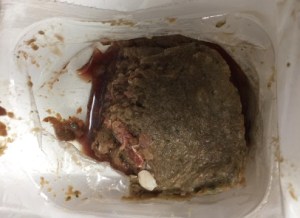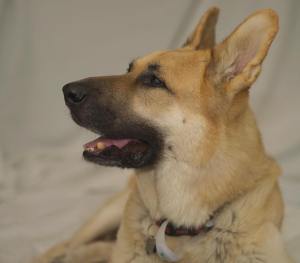
Since October 2016, Darwin’s Natural Pet Food has recalled eight production lots of raw pet food. In all, the manufacturer recalled more than 23 tons of cat and dog food during a 14-month period.
The recalls include seven dog foods and one cat food. Customers who purchased the recalled products were notified of the recalls by email — two to three months after the production dates of each batch. No recall notices were posted for the general public on the company’s website or the Food and Drug Administration’s website.
Darwin’s has not responded to a request for comment on their recalls or their follow-up actions.
The company, incorporated under the name Arrow Reliance Inc., recalled the pet foods because of positive test results showing Salmonella and/or Listeria monocytogenes. The bacteria can cause serious infections in people who handle the pet food. It can also contaminate surfaces, containers and utensils, which can spread the bacteria to foods, hands and anything coming into contact with the contaminated items.
Several of Darwin’s customers say there were product safety and package quality issues that predate the latest round of recalls.

Judy’s story
Judy adopted Blitz, an abandoned German shepherd, from an Orange County, California rescue organization in June 2012. Described by his owner as a gentle giant, he is thought to be 7 to 9 years old. About a year ago, he became partially paralyzed after developing inter-vertebral disk disease. He gets around with the aid of a special wheelchair and loves to swim.
Judy has been a customer of Darwin’s since 2012-2013. The food agreed with Blitz. His coat was soft, his stools were normal, and he didn’t itch.
About a year ago, Judy noticed a change in the Darwin’s products. The packaging was leaky, and the meat quality appeared to have deteriorated. She reported her concern to a company representative, who offered to reimburse her for the leaky packages of dog food.
According to Judy, Blitz began to suffer bad bouts of diarrhea in April 2017. He was treated with antibiotics on the assumption he was infected with giardia. Despite treatment, Blitz continued to suffer cycles of diarrhea, and was recently lab-diagnosed with a Salmonella infection.
Judy was never notified of the recalls, as she had not received any of the recalled production lots. Upon contacting the company by email after learning about the recalls, she was assured that leaky and off-color packages of meat she had been sold were “good to use.” She is now working directly with the Food and Drug Administration regarding the situation.
“I just want good, healthy food for my dog,” Judy said. “Is that so much to ask?”
Jerry’s story
Jerry volunteers at the German shepherd rescue center where Blitz was adopted. His 7-year-old German shepherd, Yavol, was 4-months-old when Jerry rescued her.
Yavol has been eating Darwin’s products for more than a year. She has suffered many bouts of lethargy, lack of appetite, diarrhea and vomiting. Yavol has been treated multiple times with generic flagyl and, on a few occasions, with antibiotics, but her digestive problems have persisted.
For the past six months or more, the Darwin’s products Jerry has been getting have had leaking packages and off-colored meat. He reported the issues to the company on multiple occasions. After being told at first that the product was safe to use, he persisted and was eventually supplied with replacement packages as compensation for the off-color and leaky packages.
Jerry did not receive notification of any recalls from the company.
Darwin’s recalled products as of Dec. 21, 2017
Darwin’s Natural Selections brand, frozen, raw Turkey with Organic Vegetable Meals for Dogs
- Package size: 2 lbs.
- Number of packages recalled: 1192
- Date recall initiated: 10/17/2016
- Manufacturing date: 7/20/2016
- Lot number: 3142070
- Reason for recall: Listeria monocytogenes
Darwin’s Natural Selections brand, frozen, raw Beef with Organic Vegetables Meals for Dogs
- Package size: 2 lbs.
- Number of packages recalled: 2391
- Date recall initiated: 10/17/2016
- Manufacturing date: 7/21/2016
- Lot number: 3146070
- Reason for recall: Listeria monocytogenes
ZooLogics brand, frozen, raw Turkey with Vegetable Meals for Dogs
- Package size: 2 lbs.
- Number of packages recalled: 1337
- Date recall initiated: 10/17/2016
- Manufacturing date: 7/25/2016
- Lot number: 3155070
- Reason for recall: Listeria monocytogenes
Natural Selections Duck Meals for Cats, frozen
- Package size: 2 lb. net weight flexible film, partitioned into 4 quadrants
- Number of packages recalled: 1560
- Date recall initiated: 9/8/2017
- Manufacturing date: 06/01/2017
- Lot number: 38277
- Reason for recall: Salmonella
Natural Selections Chicken with Organic Vegetables Meals for Dogs
- Package size: 2 lb. net weight flexible film, partitioned into 4 quadrants
- Number of packages recalled: 6,306
- Date recall initiated: 12/4/2017
- Manufacturing date: 09/26/2017
- Lot number: 40727
- Reason for recall: Salmonella and Listeria monocytogenes
Natural Selections Duck With Organic Vegetables Meals for Dog
- Package size: 2 lb. net weight flexible film, partitioned into 4 quadrants
- Number of packages recalled: 3,924
- Date recall initiated: 12/4/2017
- Manufacturing date: 09/29/2017
- Lot number: 40487
- Reason for recall: Salmonella
Natural Selections Turkey With Organic Vegetables Meals for Dogs
- Package size: 2 lb. net weight flexible film, partitioned into 4 quadrants
- Number of packages recalled: 7123
- Date recall initiated: 12/4/2017
- Manufacturing date: 08/24/2017 and 09/20/2017
- Lot number: 39937 and 40507
- Reason for recall: Salmonella
What consumers need to know
Consult the list of recalled products and do not feed your pet any food that has been recalled by the manufacturer.
Do not feed your pet any food that appears to be spoiled, off-color, off-odor, or otherwise defective.
Take special care to avoid any drippings from thawed food that could contaminate your work surfaces.
If your pet is suffering from diarrhea, be extra careful about washing your hands before handling or preparing food.
FDA tips on using raw pet food
Because raw pet food is more likely than other types of pet food to contain Salmonella, Listeria monocytogenes and other pathogens, the single best thing consumers can do to prevent infection is to not feed pets a raw diet. However, the FDA Center for Veterinary Medicine is aware that some people prefer to feed their pets this type of diet.
If you choose to feed raw pet food to your pet, be aware that you can infect yourself with Salmonella or Listeria by spreading microscopic amounts of the bacteria from the contaminated food to your mouth.
For instance, you may accidentally ingest the bacteria if you touch your mouth while preparing the raw food or after handling a contaminated utensil. If you get Salmonella or Listeria on your hands or clothing, you can’t see it or smell it, but you can spread the bacteria to other people, objects and surfaces.
To prevent infection with Salmonella and Listeria
- Thoroughly wash your hands with soap and water for at least 20 seconds after handling raw pet food, and after touching surfaces or objects that have come in contact with the raw food. Potential contaminated surfaces include countertops and the inside of refrigerators and microwaves. Potential contaminated objects include kitchen utensils, feeding bowls and cutting boards.
- Thoroughly clean and disinfect all surfaces and objects that come in contact with raw pet food. First wash with hot soapy water and then follow with a disinfectant. A solution of 1 tablespoon of bleach to 4 cups of water is an effective disinfectant. For a larger supply of the disinfectant solution, add ¼ cup bleach to 1 gallon water. You can also run items through the dishwasher after each use.
This article first appeared on Food Safety News and is reposted here with permission.

